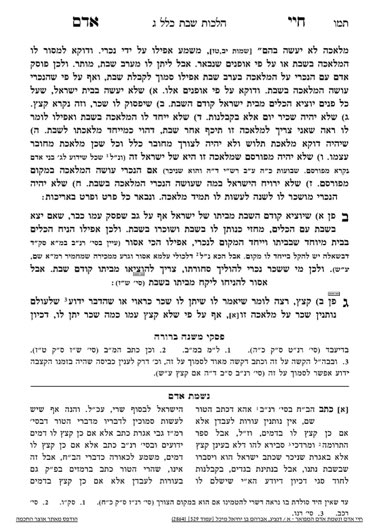We are beginning siman 3, where the Chayei Adam will discuss the second criterion for it to be permitted to make an arrangement with a non-Jew before Shabbos regarding melacha on Shabbos. This criterion is that the Jew must inform the non-Jew that he will pay him for the work performed. The amount paid must be the appropriate amount paid for the work in question.
We learned that the third criterion is that the non-Jew be hired as a kablan, meaning that he is hired for the specific job (rather than on a salary) and is therefore considered as working for himself rather than for the Jew. When he is on a salary, he is considered as working for the Jew because he is at the behest of the Jew for the duration of their agreement. Here, we are adding that, even as a kablan, when the non-Jew is working for free, he is working because he wishes to gift something to the Jew, so it is considered that the non-Jew is working for the Jew. Therefore, he must be paid.
The Chayei Adam adds that even if they did not discuss a specific price, as long as the Jew says that he will pay the going rate, it is sufficient. Furthermore, even if they did not discuss payment, if it is understood that the non-Jew will be paid, because the type of work is work which is always done for payment, it is sufficient. The non-Jew is anticipating being paid, so he is working for the money–meaning, he is working for himself and not for the Jew.
The Mishnah Berurah is uncomfortable about this last point. He holds that not discussing payment at all is only allowed when the type of work is always performed for pay, and there is a clear rate of payment. It is only when the non-Jew is both sure he will be paid, and paid something acceptable, that he is working for himself. If the non-Jew is unhappy but still working, it is not because he is working for himself, but because he wants to give the Jew the benefit of the work. If so, he is doing the work for the Jew rather than for himself. The Mishnah Berurah holds that only if there is a standard price, and it is obvious that he will be paid, that the non-Jew understands that the plan is to be paid the going rate.
Again, the idea is that the non-Jew needs to be performing the melacha for himself–i.e., to make his money–rather than for the purpose of producing melacha for a Jew.
The Chayei Adam continues, and writes that there is one scenario where the non-Jew can perform the melacha for free. If the Jew has helped this non-Jew in the past, and it makes sense for the non-Jew to pay back the Jew in order to pay of his “debt” of appreciation, it will be muttar as long as the non-Jew volunteers to perform the melacha on his own volition. If the Jew asks the non-Jew to perform the melacha for free, even if the non-Jew agrees–which shows that he agrees he owes some appreciation to the Jew–it is still assur. It looks as though he is performing the melacha for the benefit of the Jew rather than for himself.
The Chayei Adam ends this point by writing that in cases where the Jew asked the non-Jew to perform the melacha for free and the non-Jew agreed, one can be lenient and rely on melacha performed in cases of necessity. However, the Mishnah Berurah paskens that it is always assur, and that there is no allowance to be lenient.
Summary
- If one instructs a non-Jew before Shabbos, there are times when it will be muttar, depending on eight conditions.
- The second condition is that the non-Jew must be paid fair value for the work he performs. He must feel confident that he will be paid the going rate, either because the Jew verbally informs him, or because it is standard to be paid for such work and there is a clear rate of payment.
- If the non-Jew owes the Jew a debt of gratitude, and volunteers on his own to perform melacha for free, the Jew may accept the offer, because the non-Jew is still working for himself (to pay up his debt of gratitude).



